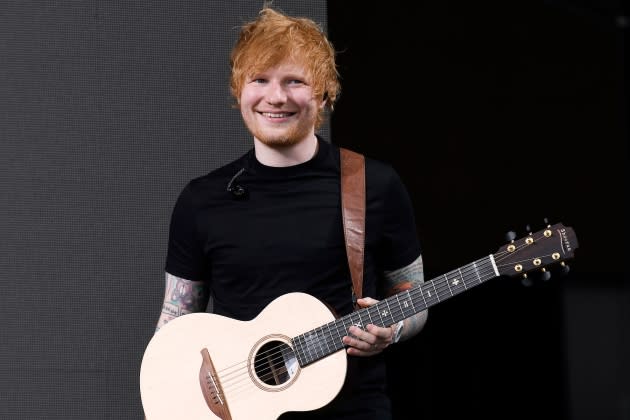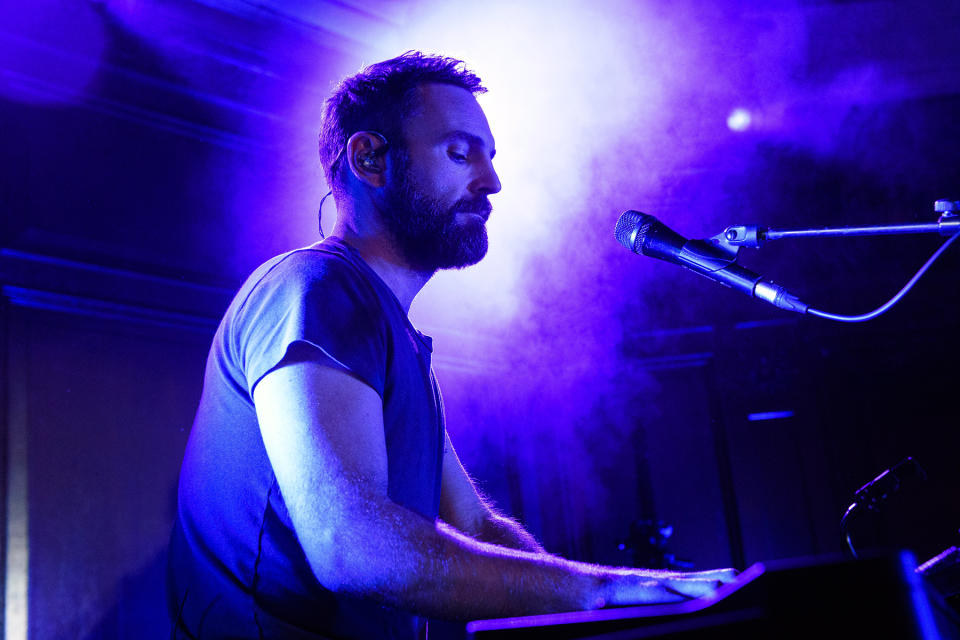How Ed Sheeran Really Writes Songs
- Oops!Something went wrong.Please try again later.
- Oops!Something went wrong.Please try again later.

Between his strong new album – (pronounced Subtract) and the week he spent in court successfully proving the originality of “Thinking Out Loud,” Ed Sheeran and his songwriting methods are under the sharpest scrutiny of his career. Other than the man himself, few have more insight into that subject than Snow Patrol guitarist Johnny McDaid, who’s been collaborating with Sheeran since 2013 as a co-writer and producer, including on the recent hits “Bad Habits” and “Shivers.” In an interview conducted for Rolling Stone‘s Sheeran cover story, McDaid, who’s also close friends with Sheeran, dives into their creative process and much more.
Ed played me an extraordinarily wide-ranging set of unreleased songs, and I know the two of you got together in the U.K. in December to do some writing. Typically, would that be for some particular project?
You know, we often go in with an intention, but the intention can change. It kind of invites itself to be whatever it wants to be. I think we took a house in Suffolk, which we often do. I’ll rent a space near to his home, and then set up there with [producer-songwriter] Steve Mac and myself. Ed and I went in for about a week of writing. We just decided to have playtime, wondering what would come along. It’s rarely prescriptive. It doesn’t stay on track about being one thing that we need to get out; it’s open to curiosity. That’s probably why he had this gamut of music that he played you because he’s so available to so many things all the time. So, anything can happen, and everything does.
More from Rolling Stone
'Subtract' On Stage: How to Watch Ed Sheeran's Apple Music Live Concert for Free
Ed Sheeran and Alanis Morissette Bring British and Canadian Edge to 'American Idol'
You once said that his openness to ideas was like no one else you’ve ever encountered. What does that ultimately mean?
A songwriter is sort of an antenna, you know, picking things up in the ether. Depending on how wide the frequency band of your antenna is, you tend to genre-fy yourself in a way, visiting certain themes or coming up with similar tropes or ideas. With Ed, his frequency band is so wide that it can really come from anywhere and be anything. It’s constantly surprising, constantly curious, constantly open to possibility and wonder. In a beautiful, childlike way, we all — I mean, the people we tend to work with — follow that down and investigate it. Ed is the conduit to this crazy-wide possibility.
Ed wrote most of his new album over music created by Aaron Dessner, and he pretty much did all of the writing on his own this time. Did you talk to him about that?
He was on his own, and I think he needed to be. He spoke to me about it, and it made so much sense. The things he was going through in his life, the things he wanted to talk about, I don’t think it could have been part of a dyad or three people. It was something he needed to say very directly. It was specifically not about anybody else’s mirroring or reflecting — it had to come from him.
This was the first thing we hadn’t done together in a long time, and yeah, it’s beautiful. He didn’t concern himself with commerciality; he just needed to get it out. In Suffolk three or four months ago, we sat down and listened to it in one go. We didn’t speak the whole time. I was really moved, really proud of him.
It does feel like a bit of a breakthrough, something we haven’t quite heard from him.
But everything he does is something we haven’t quite heard before. I’m in this odd position of being so close to him as a human and also working with him. When I hear his music and I haven’t been involved in it, I have an odd perspective because I know him as a writer, an artist, a brother, a being. As a collection, as a piece of work, it was certainly thematically consistent and very internally consistent. Whereas with Ed, because he has such availability to possibility, he can often end up with this incredible patchwork of no genre, no concern about whether this track sits with that track, because he’s so available to that. So I think with this collection, he narrowed the palette down to this very consistent perspective.
One of the big inspirations for the album was the death of his friend Jamal Edwards. Did you know Jamal at all?
I didn’t, only through Ed. I remember when I first started working with Ed, he was opening up for our band in America, and we started writing together. I ended up canceling sessions with him because my dad was very ill, and then my dad passed away. Ed wanted to know my dad through me, who he was, his life, and the things that were important to him.
One day, I was driving along a road in America, and Ed often sends me little ideas or voice notes, and he sent me this MP3, and it said “Mr. McDade” on it. He had written the most incredible diaristic story of my dad’s life, illness, and passing, and what it meant to my family and me. He wrote it from my perspective, but I didn’t write the song. I just told him the story over the years. What an extraordinary gift that he’s able to integrate my perspective, my version of my father, my mom’s version of my father, and put that into a song that was better than I could have written about my story. So to answer your question, I met Jamal through songs.
I’m not sure everyone realizes that Ed is in the top 10 most streamed artists of all time. Is there a sort of disconnect, or are there misconceptions about him that somehow impede people’s full understanding of his magnitude as an artist?
He’s an anomaly. He doesn’t act like he’s in the top 10 streamed artists of all time. And imagine if you added his songwriting for other artists into it. He’d probably even higher up the list. He approaches every song he writes as if it’s the first song and the last song. He approaches it with this real tenderness and curiosity. He sees the blessing of it all the time.
I think maybe there’s a misconception that he’s flippant, because he’s so very prolific across many genres. And I think that would be a misconception, that he’s sort of just churning out songs. They’re all important to him. We always say, when we go into a room together, that every song we write is important, because even if it never gets heard, it alters the next song we write, and the next one we write. I think he really treats it with this honor, and I don’t know that people realize that he has that sense of honor. He’s very grateful to do what he does; a lot of people in his position aren’t. And he’s vocally grateful about it. He walks into the room to write a song, and he tells me, you know, for the last 10 or 11 years, how grateful he is to be doing this.

You guys are really close. He even introduced you to your girlfriend, right?
Yeah, I mean, Ed introduced me to Courteney [Cox]. He knows my family; he knows my band. He’s friends with my friends. We have mutual friends. His wife, Cherry, and I are really close. I’m godfather to his daughter. We have so many lines that cross.
He thinks that right now is the most creative time of his life, and he also said he doesn’t know how long that will last, so he wants to do as much as he can. What do you make of that?
If you take it as a sort of transient snapshot, I’m sure he does feel that this is the most creative time in his life. But every time in his life that I’ve known him has been exceptionally creative. I’ve never seen him dry up for ideas. But again, that sounds to me like someone who’s grateful and has an awareness of the finitude of things; that no one lives forever. The songs we make kind of do persist past us. And I think he’s quite aware that the things that he makes in his life will exist even when he doesn’t if he says it’s the most creative time in his life, I’d say wait till next year. For as long as his heart is beating, he’ll make things happen.
How does he jump so wildly from genre to genre without sort of losing himself?
I think with Ed, the journey is about finding himself, which is quite the opposite of losing oneself. He’s constantly peeling back layers, he’s constantly curious. If something inspires him or resonates in his heart, then he’ll walk towards that light, he’ll pull back the curtain, and wonder what’s behind it. And he’s not really restricted by some of the rules that I might have been when I met him. He’s taught me so much about this. He’s from the cusp of a generation that was able to access this huge mass of music in a transient way, and be drawn to something. It wasn’t like he had to wait for a week before he got the album.
I remember playing Bruce Springsteen for the first time for Ed, and he went back straight away and listened to every Bruce Springsteen song ever and became kind of obsessed by how this guy worked. I think I played him Nebraska, seven or eight years ago, and he then suddenly found this huge catalog of Bruce Springsteen that he got to look at. And I think it’s been the same for many artists. When he comes across something that inspires or touches his heart, he goes after it.
You obviously are in a rock band, and that’s your main background. How do you see Ed’s relationship to rock?
I don’t think his relationship to any genre is ossified or stuck in any way. He has a relationship with rock as he does with rap, folk music, and even musicals recently. He’s touched and moved by rock music as much as he is by other genres. It’s such an inspiring thing to see someone who’s not fixed in any one way. There’s no stasis as a genre. We can’t listen to his body of work as a writer and say he is of any particular genre. He’ll put on an old folk song that was recorded in 1972, and he’ll be as inspired as he is by something that’s in the charts right now.
It seems like all that musical stretching has been kind of mind-expanding for you.
Yeah, he’s taught me a lot. He’s brought me into figurative spaces I wouldn’t otherwise have investigated. We kind of joked one time that he wanted to write a drill song, and I thought he was going to get his tool kit out, because I didn’t know anything about drill music. He teaches me so much. He shows me that there’s inspiration amongst all of these things. If someone has something to say, and it’s important that we say it in music, then it’s probably worth listening to. And that has been really enlightening for me.
Best of Rolling Stone

